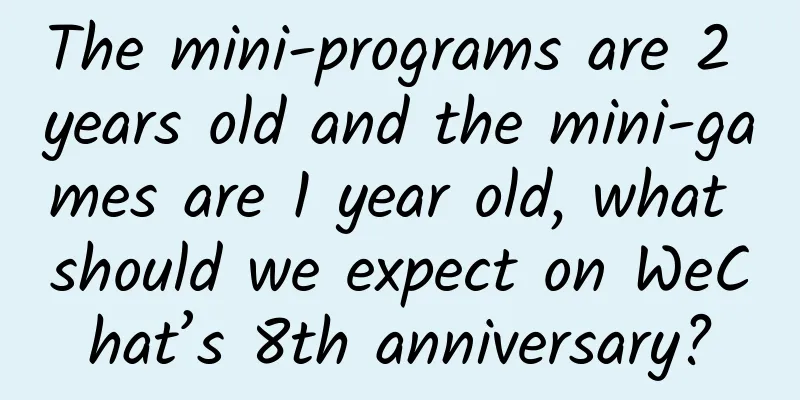The mini-programs are 2 years old and the mini-games are 1 year old, what should we expect on WeChat’s 8th anniversary?

|
There are still 14 days left until 2019, and WeChat is about to enter its eighth year. Whether in terms of product direction or business boundaries, WeChat seems to be approaching a key turning point of transformation. When talking about the present and future of WeChat, mini programs and mini games are two topics that cannot be avoided. On the one hand, mini programs carry the future of WeChat, and on the other hand, the excessive popularity of mini games is really troubling WeChat. Now mini programs are about to be two years old, and mini games have been online for a year. These two actions that are the most important and most watched by WeChat in recent years have already brought about an impact that has long exceeded the scope of a simple App. Because of the special nature of WeChat in China, mini programs and mini games have been fiercely stirring the nerves of the domestic Internet since their birth.
Over the past two years, the domestic Internet's attitude towards mini programs has been a damping movement that swings back and forth between "mysterious enthusiasm" and "mysterious pessimism." However, as WeChat gradually opens up its interface capabilities and developers gradually become familiar with the rules of the game, this swing is slowly becoming smaller and returning to a rational middle point. Mini Programs carry many of WeChat's plans for the future, and for the current size of Mini Programs, direction has long been more important than speed. Where is the future going? This has become a topic worth talking about. Any prediction that is divorced from the current situation is a hooligan. Today, Geek Park will talk about the journey of Mini Programs and Mini Games. Mini Programs start high and end low "Don't overestimate in the short term and don't underestimate in the long term." This may be the most accurate evaluation of WeChat mini programs. 2018 was a year of rapid development of mini programs, but it was also a year when apps could not find a focus, so we saw the emergence of many mini program platforms. After WeChat, Alipay and Baidu entered the market, and Toutiao joined the battlefield soon after. Mini programs have evolved from WeChat's only one to another Internet war today. Although it is still difficult to answer "Is this the era of mini programs?", it is becoming a matter of course that platforms with large traffic have invested in mini programs, and no one is opposed to using mini programs to explore new business and growth possibilities. This new competition will inevitably have winners and losers, and WeChat currently has the greatest chance. As the earliest player, WeChat Mini Programs are currently the most prosperous in China and even in the world, whether in terms of application ecology, user base or development environment. According to official WeChat data, WeChat Mini Programs have been online for nearly two years and have covered more than 200 sub-industries. As of July 10, more than 1 million Mini Programs have been launched, with more than 1.5 million developers and more than 5,000 third-party platforms. The average number of Mini Programs opened per person per day is 4 times, of which 54% are opened by users actively. The past two years for WeChat Mini Programs have not been smooth sailing. It took only half a year for them to go from the huge enthusiasm when they were first launched to a rapid cooling down afterwards. Just three months after the launch of WeChat Mini Programs, a lot of negative public opinion began to emerge, questioning whether the Mini Programs were really valuable and whether Zhang Xiaolong had been too restrained... This was due to the industry's excessive expectations for WeChat, an app with an MAU of over 1 billion. More importantly, there was an expectation gap caused by the lack of sync between these high expectations and the product rhythm of the WeChat team itself. Mini Programs seem to be the first major update in the history of WeChat products that was announced before it was completed. Even after a period of internal testing, as a new ecosystem, many basic functions have not yet been perfected. Moreover, because Mini Programs are the key to WeChat's future service capabilities and even commercialization, its ecological foundation is "right or wrong". After the success of official accounts, everyone knows that WeChat has traffic dividends, so each new platform of WeChat will attract countless traffic players to go to gold rush, and Mini Programs are no exception. However, if an ecosystem is overly occupied by traffic diversion and marketing activities at the beginning, it will inevitably inhibit the development of its core functions. In the long run, the core functions cannot be developed, and users cannot be retained after the popularity is over. Traffic players will also leave the market, leaving only a deformed ecosystem and a mess. Perhaps it is precisely to avoid becoming a marketing traffic harvesting field that WeChat Mini Programs did not provide a relatively convenient monetization path at the beginning. Just when the speculators at the forefront began to predict the decline of the platform due to "no profit", WeChat began to intensively open up its capabilities and interfaces in the first half of 2017. After filtering out the first batch of traffic speculators, the mini-programs began to rapidly iterate around the ecological construction. Hot-selling products and developer ecosystem E-commerce was the earliest breakthrough point for WeChat Mini Programs. After creating the myth of the first batch of millions of DAU and tens of millions of users through social e-commerce, it also started the second boom. Through the intensive and orderly opening of capabilities in the first half of the year, WeChat Mini Programs are guiding and exploring step by step. For six consecutive months, the Mini Programs have an average of 3-5 major actions every month, including lowering the development threshold and "unblocking" a large number of capabilities such as cards and coupons, long-press QR code recognition, sharing and forwarding, public account diversion, group capability interfaces, etc. This also helped the rapid growth of tools, e-commerce, social networking and other mini programs, and a large number of popular applications were born. The most eye-catching of these is the rapidly growing social e-commerce that has been connected through the social chain. Pinduoduo, Mogujie, Queen's New Style, etc. all began to grow rapidly during this period and developed a decentralized traffic depression. Double 11 in 2017 was the most important node of the year. Last year, when all eyes were on the 100 billion battle between Tmall and JD.com, WeChat Mini Programs were quietly becoming another new continent for "survivors". E-commerce organizations including JD.com, Mogujie, and Zhuanzhuan all achieved very impressive results on Double 11. For example, Mogujie, which was the first to try it out, had a 4.2 times higher proportion of new customer transactions through Mini Programs on the WeChat platform than APP last Double 11; the user purchase success rate was 16.1% higher than that of APP; and the purchase speed was 2.28 times that of its own APP. During this year’s Double 11, mini programs continued their momentum and gradually became the third player in the Double 11 war. According to official WeChat data, compared with the period from November 1 to November 11 last year, during the same period this year, the daily active users of brand-owned mini programs increased by 7 times and the transaction amount increased by 22 times during this year’s “11.11” period. At the same time, WeChat has not stopped building its ecosystem. After intensive iterations in 2017, WeChat has released nearly 20 capabilities this year, focusing on lowering development barriers, enriching scenarios, and speeding up access for mid- and long-tail developers. And on March 28 this year, WeChat also announced the launch of the first batch of mini-program development courses in cooperation with Udacity. At that time, it was Udacity that helped Google launch Android development courses, cultivate and certify Android developers around the world, and witnessed the popularity of Android and the formation of the Android ecosystem. In addition, this year, the mini-program also launched the "cloud development" capability, providing a one-stop back-end service, which truly opened up the link between the mini-program front-end and cloud resources. Soon after, WeChat also established the "China University WeChat Application Education Alliance" with many well-known domestic universities and actively held developer competitions. After creating the god of traffic, WeChat did not give up on stimulating the creativity of the mini-program industry in a controllable way in a relatively mature development environment. The outbreak and “out of control” of mini games Mini games are the best booster for mini programs, but at the same time they have also become the biggest trouble for WeChat. Mini games are a type of mini program, but because they are special enough, they are mentioned separately. With only three days left in 2017, WeChat Mini Program launched the "Mini Games" section, and the opening of mini games has accelerated the process of releasing the energy of mini programs as a whole. Just 18 days later, at the 2018 WeChat Open Class PRO, WeChat disclosed the data of mini games for the first time - a total of 310 million users, of which "Jump Jump" has a DAU of more than 100 million. This is a result that surprised Zhang Xiaolong. He even joked internally that Jump Jump has suddenly become the game with the largest number of users in history. The above-mentioned achievements have given a shot of "stimulant" to many developers who plan to develop mini-games. On April 4 this year, WeChat officially opened the test to the public and opened registration to developers. Soon after, it announced the business model of mini-games (Android props in-app purchase + mini-game advertising component internal testing). So far, mini-games, as the most popular type of mini-programs since their inception, have officially landed on the WeChat platform with a smooth business path. This paved the way for the subsequent popularity of mini-games. When third-party mini-games were opened up and began to pour in, popular mini-games began to emerge one after another, including Guess the Idiom, The Strongest Bullet, King of the Brain... A large number of outstanding mini-game developers have become the hottest traffic on the mini-program platform. Mini games took advantage of WeChat's social fission and began to attract new users crazily. With the help of mini games, the ecological activity and number of users of WeChat mini programs began to grow significantly. But at the same time, the popularity of mini games also began to show signs of being out of control. The group sharing of many mini games began to affect the overall experience of mini programs and even the use of WeChat itself, so WeChat soon restricted the sharing and jumping of mini games. Mini games seem to have become WeChat's happy trouble. On the one hand, the traffic and development enthusiasm brought by mini games are indispensable to the entire mini-program ecosystem. But on the other hand, the huge profits of mini games will attract many traffic speculators, leading to a decline in the overall experience. WeChat is 8 years old, what should we expect? If you want to observe WeChat, Open Course Pro is undoubtedly the best way, and mini programs have become the "protagonist" of Open Course for two consecutive years. The annual WeChat Open Class Pro is coming soon. Zhang Xiaolong announced the launch date of Mini Programs on December 28, 2016, and opened the class with the Jump Game on January 15, 2018. Zhang Xiaolong has been promoting Mini Programs in the open class for two consecutive years, conveying WeChat's own understanding of the product to the outside world. Now, after ups and downs, the WeChat Mini Program ecosystem has gradually become fuller, and the outside world's expectations for Mini Programs have become more rational. What should we expect from this year's WeChat Open Class? Today’s mini programs have gradually grown into a mature ecosystem. Compared with the growth rate, the direction and ecological atmosphere are undoubtedly what WeChat values more. Further expanding categories, lowering the development threshold, and supporting brand mini programs... these may become the main dynamics of mini programs in this year’s open class. In terms of mini games, after this year's explosion in popularity, I believe WeChat will further express its understanding of the product to the outside world and help developers and users understand the essence of mini games, just like Zhang Xiaolong re-explained the essence of mini programs in the last open class. According to WeChat's official news, WeChat will launch a series of capabilities and support policies in this year's open class to implement the mini game creativity encouragement plan, so that creativity can become the brand of mini games; and will try to redefine mini games, telling everyone that mini games are not just games, but can also be news samples, tools, high-quality content, and even a kind of goodwill transmission. Perhaps this year's open class will give us a new understanding of mini games. |
<<: Why can't the iPhone be made in the U.S.? Jobs gave the answer
>>: Google: More than half of search results have shifted to mobile-first indexing
Recommend
ID photo PS retouching tutorial "The most beautiful ID photo retouching" video tutorial
Training course video content introduction: By ma...
How can education and training companies leverage hot marketing trends to boost brand communication?
In the fragmented Internet era, the rich media in...
With 50 million fans across the internet, what is Dingxiang Doctor’s replicable methodology for creating hit content?
Founded in 2014, after more than five years of de...
16 Lectures on Cosmology by Professor Zhao Zheng from the Department of Physics, Beijing Normal University
Introduction to Professor Zhao Zheng's 16 Lec...
How much does it cost to join a meat and poultry mini program in Hohhot?
What is the price for joining the Hohhot Meat and...
Interpreting the "new connotation" of 5G, GMIC kicks off the "Beauty of Super Order" in 2019
On January 15, 2019, the launch conference of GMI...
What are the methods for app promotion? Share 5 tips!
As the most important distribution channel for Ap...
App Promotion: How to Take App Screenshots to Influence Download Conversion Rate?
App screenshots are the most direct way to showca...
17 Tik Tok tricks to predict how to make a hit
In fact, this article is about creativity. Some o...
Baidu search for 18 details of ocpc (Part 2)
Continuing from the previous article "18 det...
"Double 12 Event" keyword ranking/ranking ASO source, low price source!
The optimization of Apple App Store keyword ranki...
Zhongshentong - How to get over 10,000 followers in 15 days, a must-learn for short video accounts
Zhongshentong - How to get over 10,000 followers ...
【2014】GitHub China Developer Annual Report
[[127178]] Produced by GitHuber.info team Preface...
KEEP product analysis
During the Spring Festival, Keep Live Class launc...
A look at the 100,000+ operations methodology from Toutiao
I believe that many people who work in self-media...









